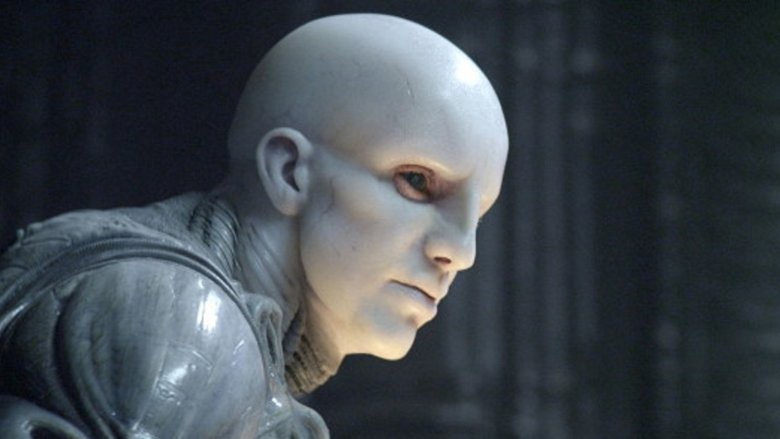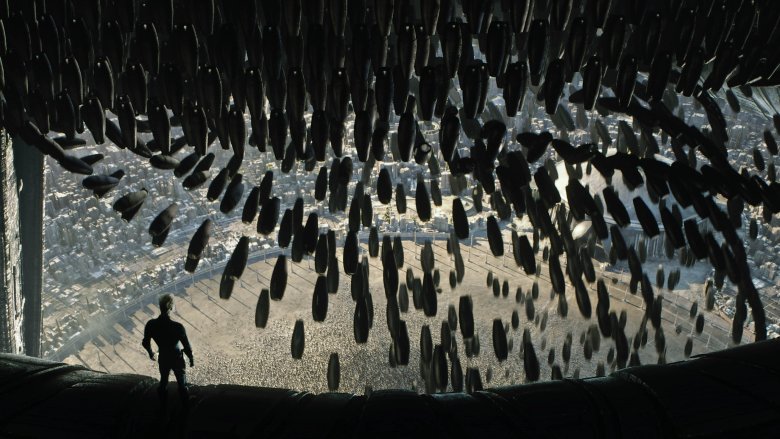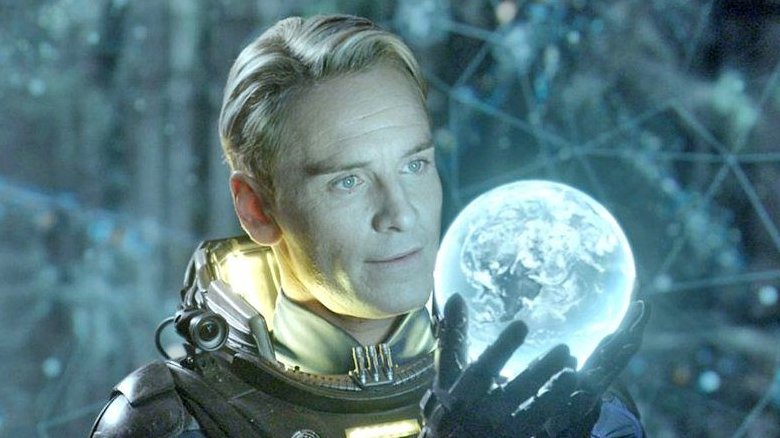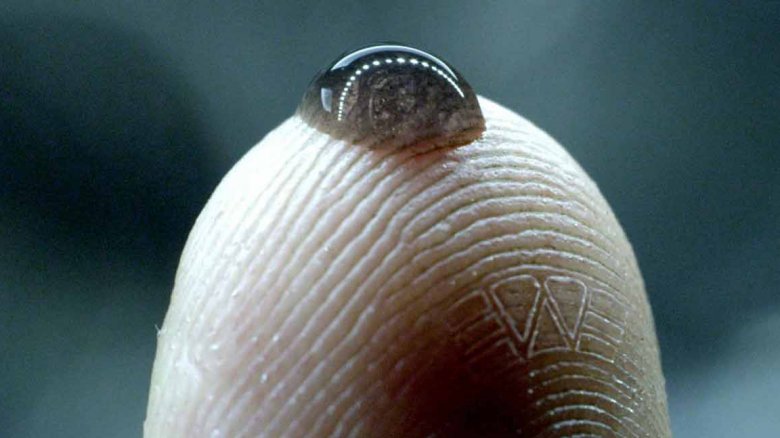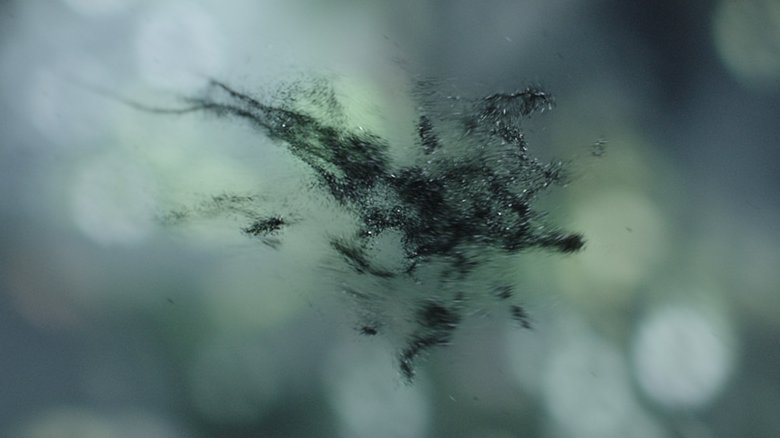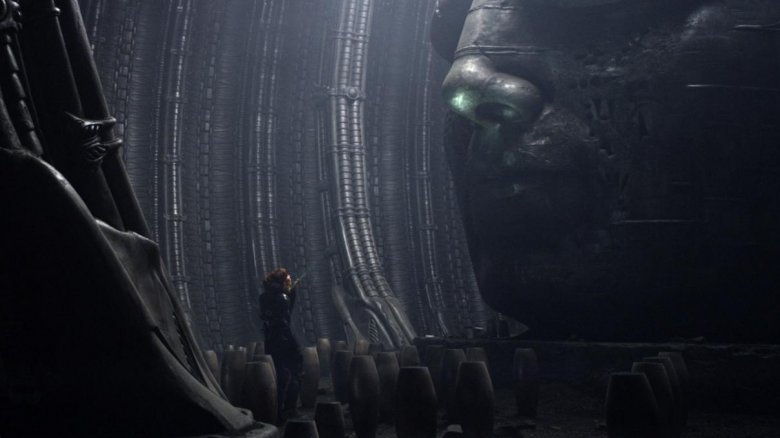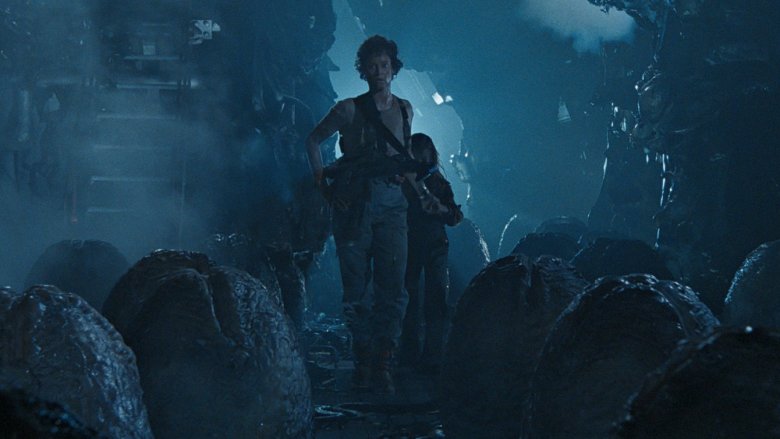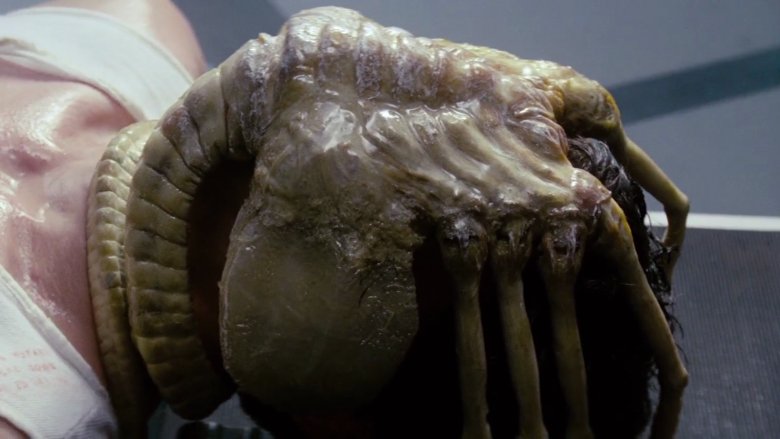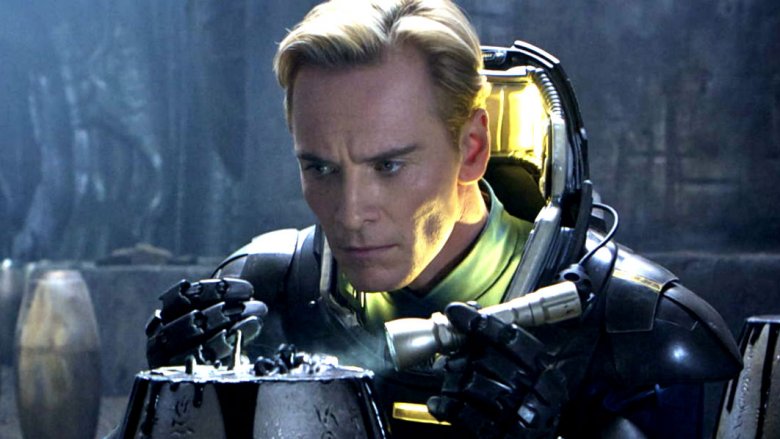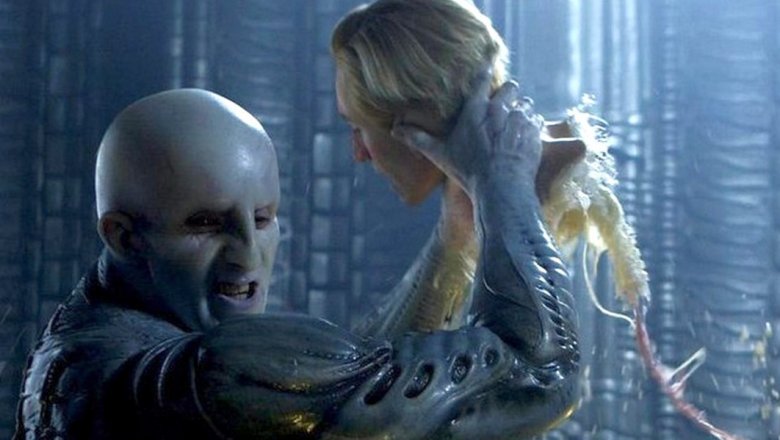Biggest Unanswered Questions In Alien: Covenant
Alien: Covenant promised to explore the mysterious and goopy lineage of the xenomorph species that we all know and love, but in many cases, it just left the entire Alien franchise open to even more questions. Let's burrow into Covenant, stick our ovipositors down its throat, and see how many plot points are still waiting to hatch and burst forth in future franchise installments.
Who are the Engineers?
More than anything else, Covenant needed to explain what the heck its prequel Prometheus was all about. Seen by many as an unnecessary addition to a pretty solid trilogy about scary space monsters on a murder spree, Prometheus introduced us to the Engineers, an alien race who inexplicably catalyzed life on Earth. We don't know exactly why, and that's what the crew of the Prometheus sets out to discover.
However, once the android David actually finds the Engineers and all of the answers are within reach... he slimes them. An entire city of Engineers is destroyed by David's stock of evil black goo. We never learn who the Engineers are, why they do what they do, or where they came from. And thanks to David, we may never know.
Why did David kill the Engineers?
The motivations of the Covenant's human crew are pretty straightforward: just don't die. However, the Alien franchise's androids tend to be more inscrutable, and none are more confusing than David. It becomes clear in both Prometheus and the introduction to Covenant that David sees himself as superior to humans, and even expresses the bizarre idea that all creations want to kill their creators. Sure, you might be mad at mom for not letting you borrow the car on a school night, but that's pretty much the extent of matricidal rage that most people reach. So why exactly does David wipe out the Engineers?
David's vendetta
It's possible that, as mankind's implied creators, David is just taking his murder plot one step deeper into his ancestry, but there isn't a whole lot of meaning there. And he definitely doesn't do it to protect Earth from the Engineers. So what's the deal with David's ultimate vendetta? We can still only guess at his ultimate motivations — or ultimate goals.
What did the goo do?
When we meet David again in Covenant, he leads the crew into the derelict city of the Engineers, through masses of their dead bodies, thanks to David's stunt. But what exactly did this goo do?
Meditation on space slime
As far as anyone can tell, the black goop mutates any living animal it comes into contact with, but we never find out what it did to the Engineers. It wouldn't exactly make sense if it just killed everyone on sight, because goo isn't there to just flat out kill things. But if the goo did what goo usually does, the entire Engineer planet would be swarming with xenomorphs. So where did all of those potential xenomorphs end up after ten years? What happened in the five minutes after the goo drop?
Why was the Engineers' planet lifeless?
The planet that the Covenant lands on is ideal for life, but inexplicably, the crew can't seem to find any. No birds, no bugs, just silence.
As David tells his increasingly terrified guests, the virus he dispersed was made to seek out hosts—either as incubators or as unwilling cross-breeders—meaning that "the meat" on the planet became an immediate target as soon as he dropped his payload. But none of the 'morphs that would have resulted from his attack seem to be around.
Hide and seekosystem
Despite the utter lack of life, there still seems to be a bustling ecosystem on the planet, which doesn't make a lot of sense from a biological standpoint. So what gives? Ultimately, trying to comprehend what goo can and cannot do is a job best left for Ridley Scott's pulsating nightmares, but that mysterious decade where David was left to his own messed-up devices leaves too many mysteries for the continuity-concerned.
What's up with those spores?
The crew of the Covenant gets their first taste of alien madness when a couple of dinguses decide that helmets are for wusses and go around breathing in whatever they feel like on a strange and dangerous world. They brush against some spores, suck in some alien dust, and after a little while, have monsters bursting out of their giblets. It's basic science.
Except human DNA and Engineer DNA are, allegedly, nearly identical. It wouldn't make much biological sense of the Engineers' planet was rife with a virulent strain of murder-monster mushrooms, so these balls of alien death-confetti must not have always been there. Instead, they must have been caused by David's use of the goo. The goo can mutate every animal it comes in contact with, so why did it very selectively choose one plant to turn into a vehicle for the species?
Arguably, it's not a plant at all that shoots out those spores, but that still leaves questions. Were these pods part of David's later experiments? Do they represent the virus in a form of hibernation?
What makes facehuggers better?
While we're on the subject of spores versus eggs, why are Facehuggers treated as a superior form of alien evolution? It's not immediately obvious that the xenomorphs that the spores produce are inferior to the xenomorphs that the Facehuggers produce. On top of that, the spores' method of propagating the species is only a million times more efficient than the alien egg pods. The choice is simple: your species propagates because an idiot actively agitates a giant, ugly egg and waits for its terrifying contents to attack said dunce and shove an egg tube down their throat, or your species lives on because something gently brushes against a small plant with their toe. The more efficient method is clear.
Is David the xenomorph whisperer?
It's easy to argue that aliens aren't interested in androids because they don't really have a lot of delicious edible parts, so if you're a synthetic being, you pretty much get a xenomorph hall pass. But why are the xenomorphs David is cultivating strangely loyal to him? Not only do they seem to respect him, but the whole baby-xenomorph-mimicry deal demonstrates that somewhere, deep in their biology, this cycle of aliens in some way sees David as a leader, or at the very least, one of the only living things that's not worth immediately killing—which is really saying something when you're an animal designed only for killing.
We know xenomorphs don't imprint on the first thing they see like many Earth animals, so how does David automatically have this dominion over the beasts?
Is Walter still alive?
Alien is a franchise that relishes showing the audience every gory detail of every bloody death, so when someone dies and you don't at least see their viscera-strewn corpse, you know something's up. During the first phase of the big fight between David and Walter, we see that Walter has the ability to heal himself. While he takes a few minutes to reboot, it seems like he can recover from some pretty deep wounds. During the second phase of their big battle, we learn that David comes out on top and switches places with Walter, apparently getting the best of him once again with the aid of a nearby knife. We never learn Walter's fate, but when even an earlier android model like David can survive the decapitation of Prometheus, we can assume that Walter is still alive. Or can we?
Aren't there better ways to learn recorder?
You're an android who can process a billion teraflops of information per second. You're basically a human being, but better in every way. So why can't you learn to play the recorder without someone else shoving it in your mouth and playing the notes with your fingers? Or was that just David and Walter getting a little freaky in a cave because it gets really lonely on a planet where you've killed everyone?
Sure, David was given the ability to create, while Walter didn't have that particular program installed in him, because honestly, it made David a little freaky. But the logic flaw here is that recitation isn't creation, and any basic android would be able to repeat the motions they're instructed to perform without much thought. If you can teach a swarm of first graders to play "Silent Night" for the annual school recital without grabbing their hands and being a creep about it, we're pretty sure an android could have done at least the same serviceable job... with a lot less innuendo.
